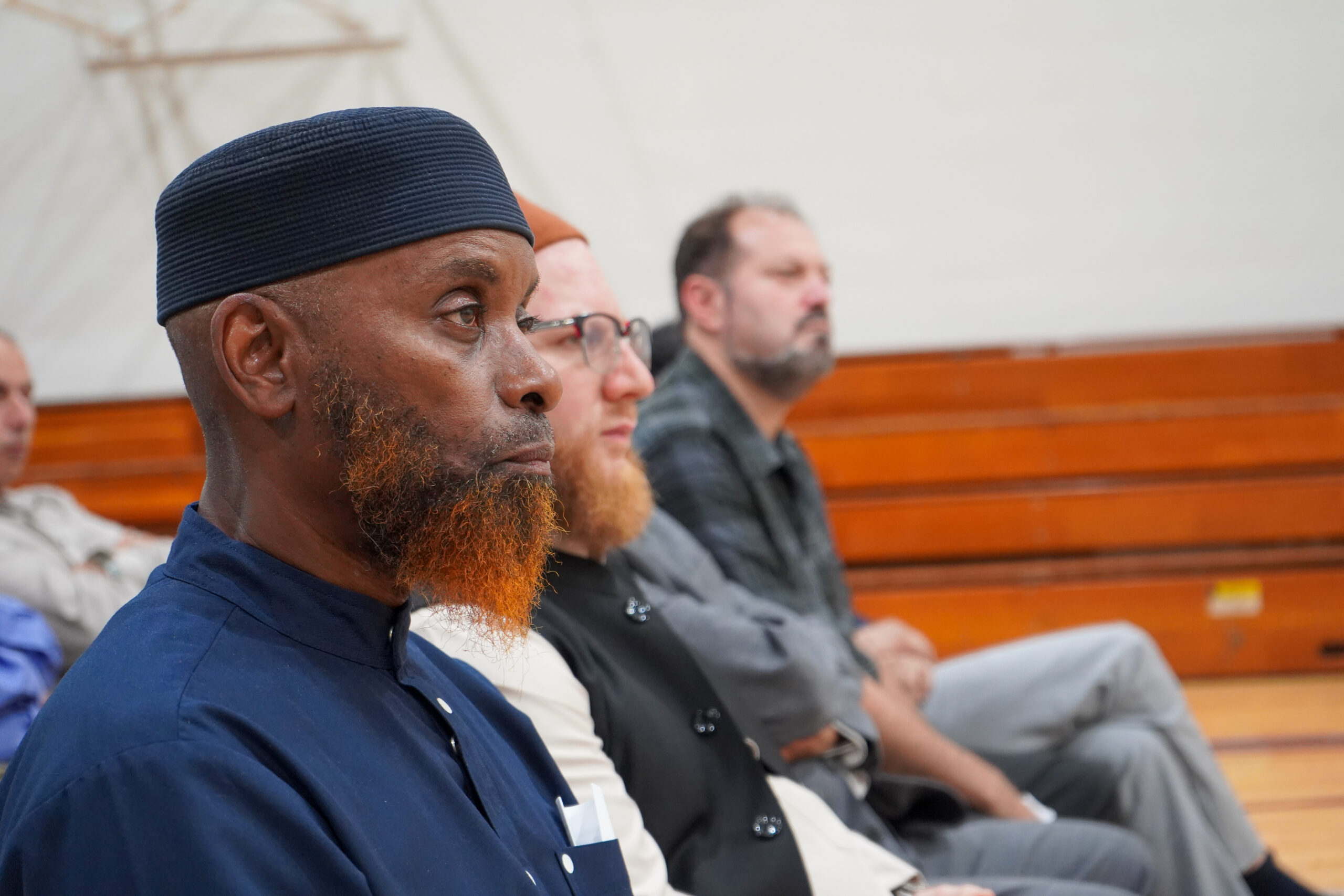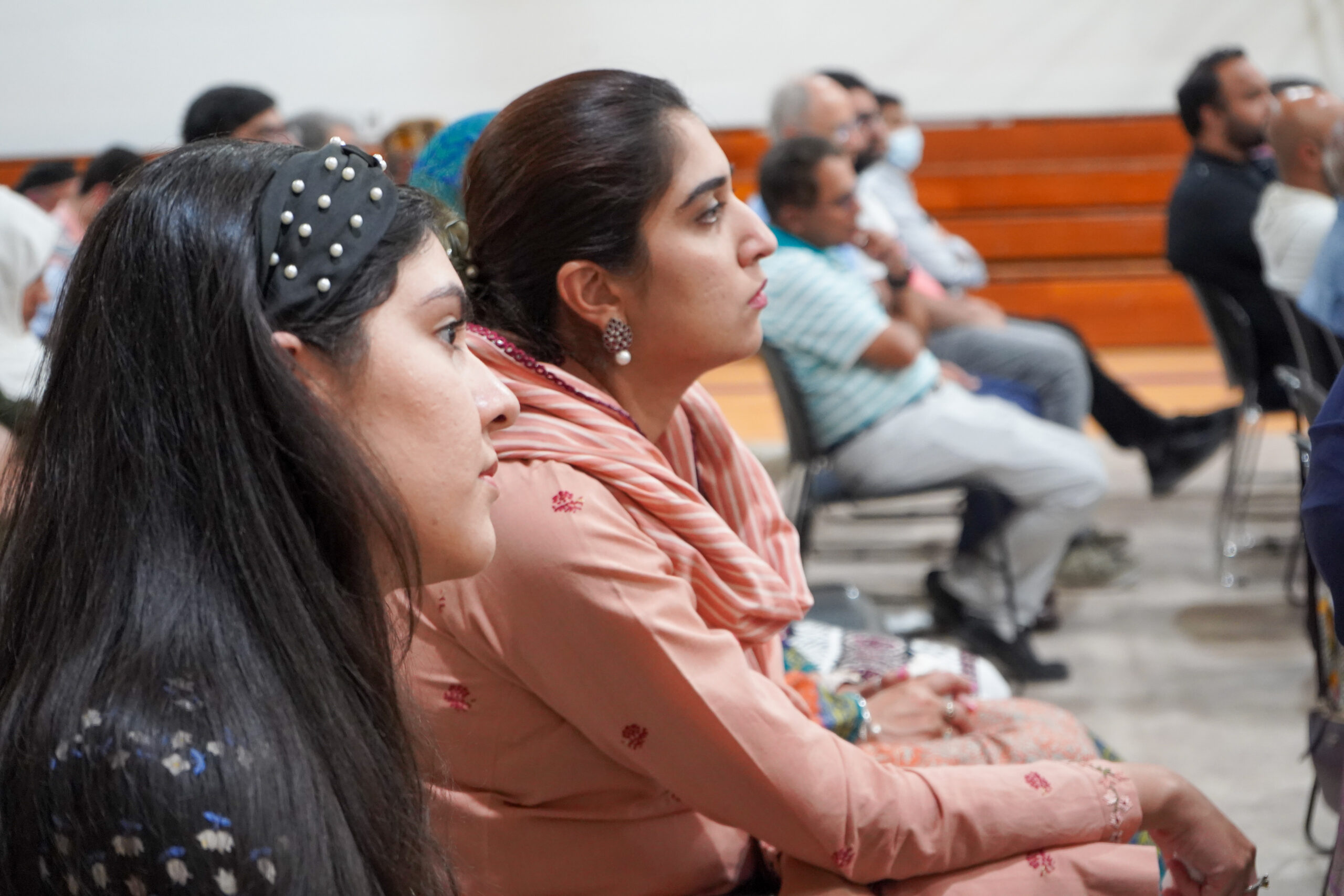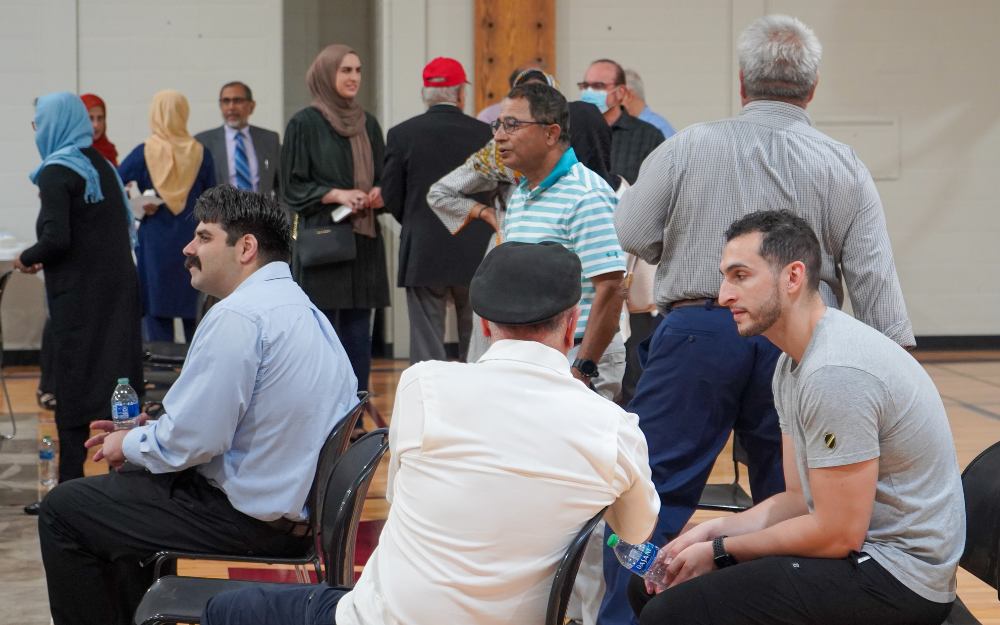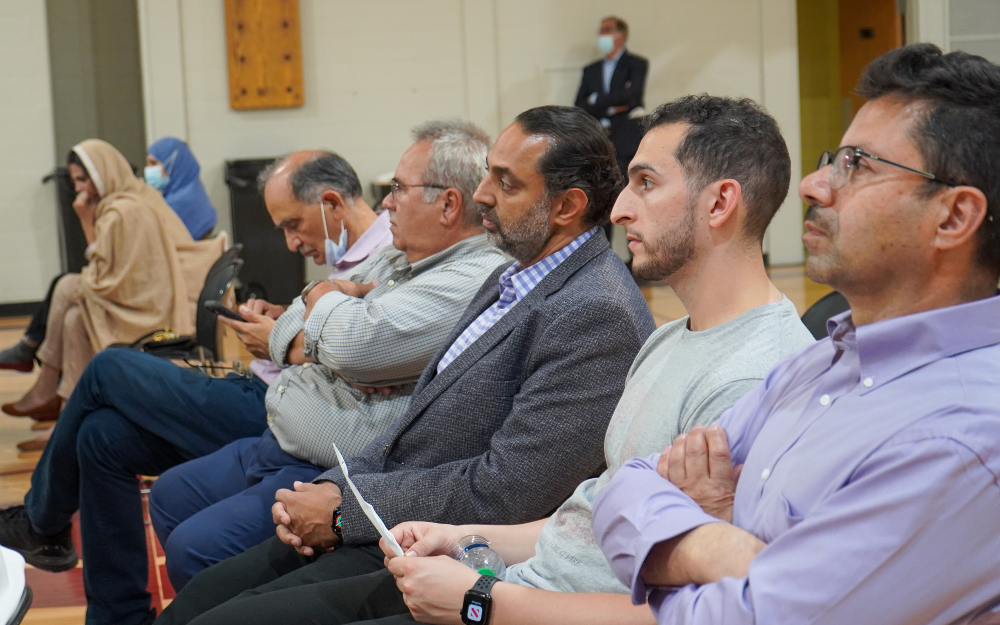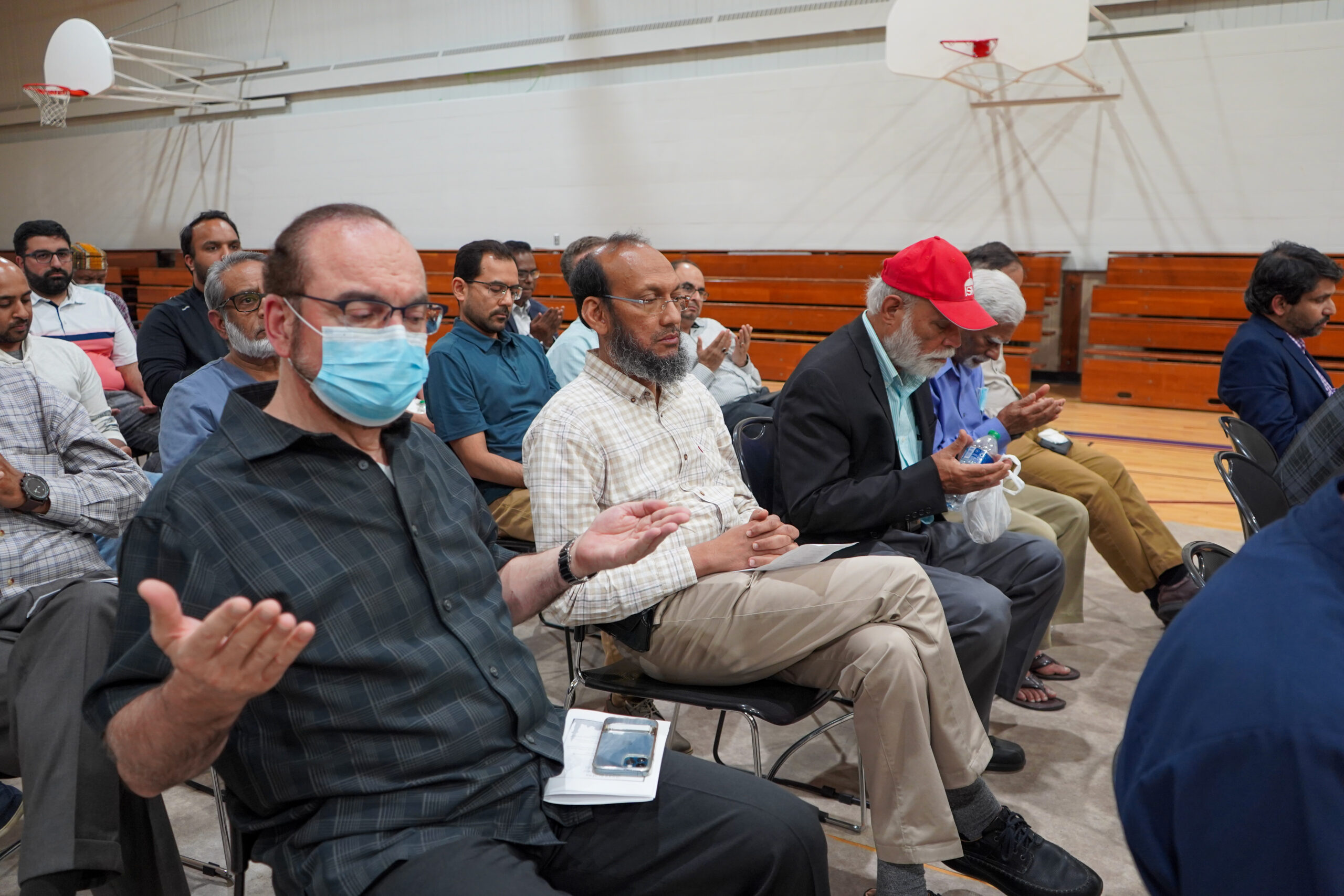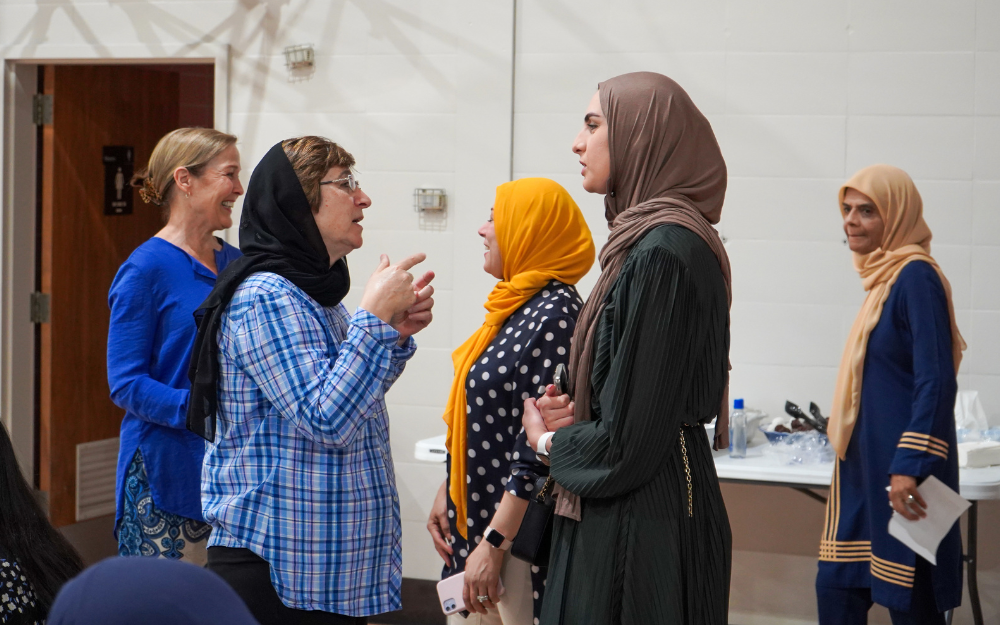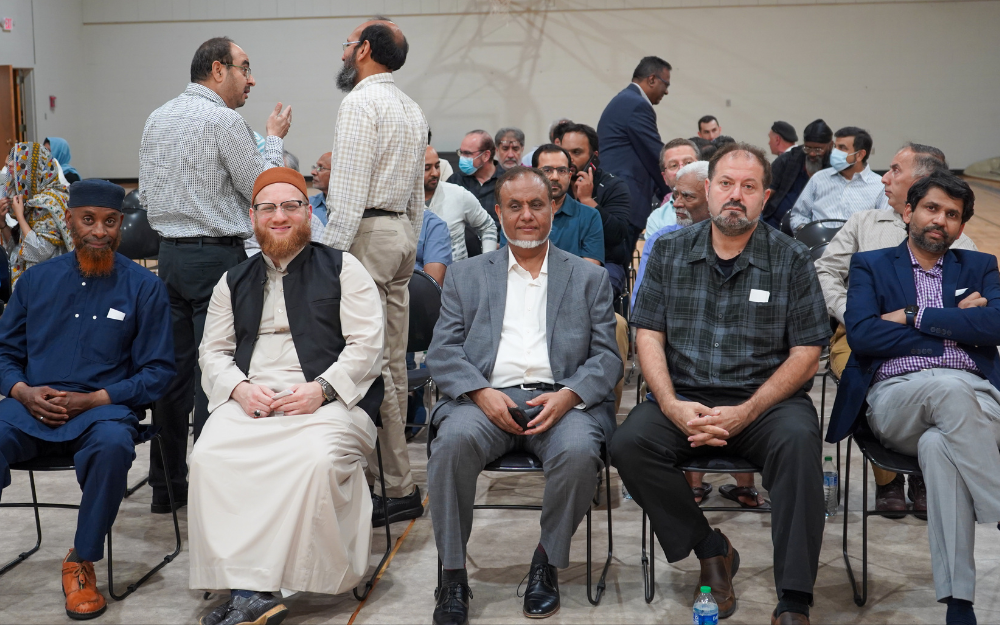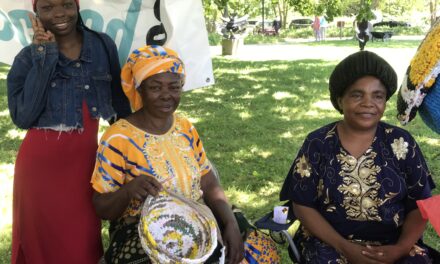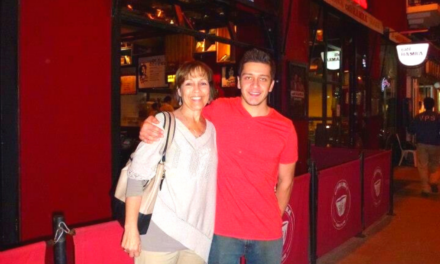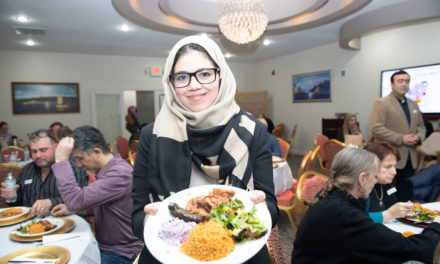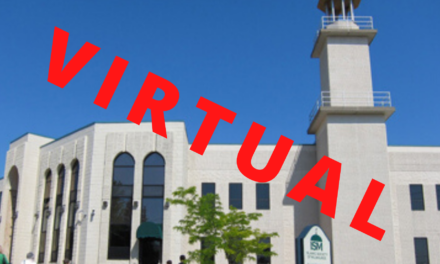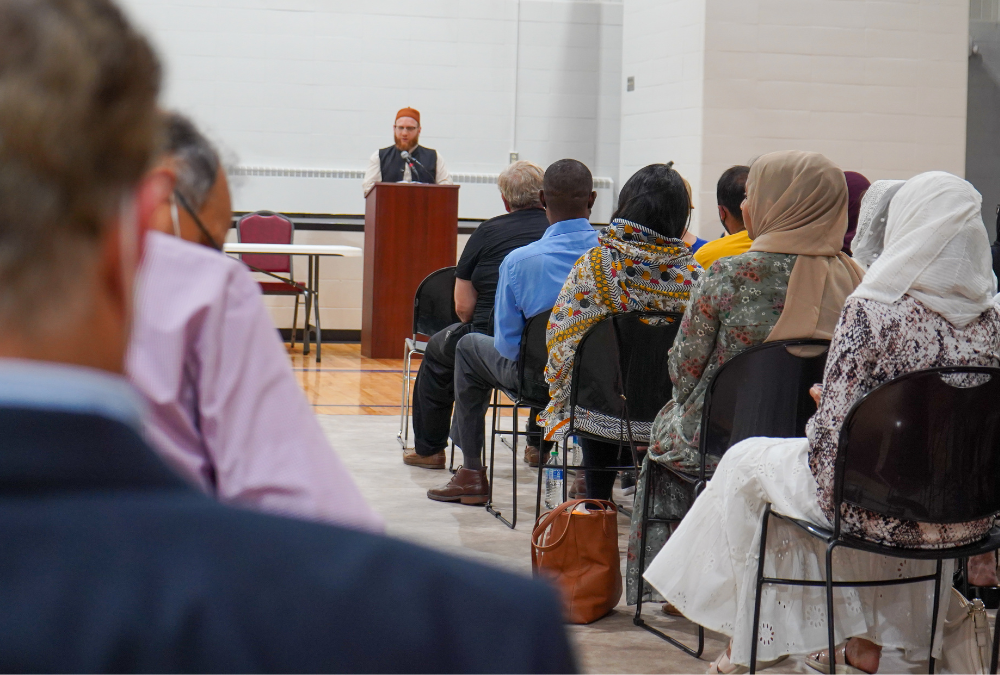
Photos by Kamal Shkoukani
Sayyid Sameer Ali speaks to an audience of Sunni and Shiite Muslims gathered to pray for Muslim unity.
“Sectarian hate has no place in our faith,” said Naheed Arshad of Mequon, one of the organizers of the “Sunni & Shia Prayer for Unity” event held Wednesday. “It is important to stand up and reject any kind of hate towards each other.”
Arshad is a member of a Shiite-Sunni Muslim Unity group that, with the Wisconsin Muslim Civic Alliance, organized an event to bring together Sunni and Shiite* religious and community leaders to address intrafaith bias in the aftermath of recent shootings of Muslims in Albuquerque, New Mexico, that news reports linked to a possible Sunni-Shiite sectarian dispute.
“Although later news indicated what happened in Albuquerque was more personal than sectarian, in the moment everyone was saying, ‘These conflicts are happening around the world; we don’t want this in the U.S,’” Arshad said.
The “Sunni & Shia Prayer for Unity,” held Wednesday at Insight Life Learning Institute, 13780 Hope St., Brookfield, brought together Muslim leaders and community members—Sunni and Shiite—from Greater Milwaukee and Madison “to reject any form of sectarian religious violence, whether in the U.S. or abroad,” a flier announcing the event said.
*WMJ uses Associated Press Style, which uses the spelling Shiite unless quoting another print source directly.
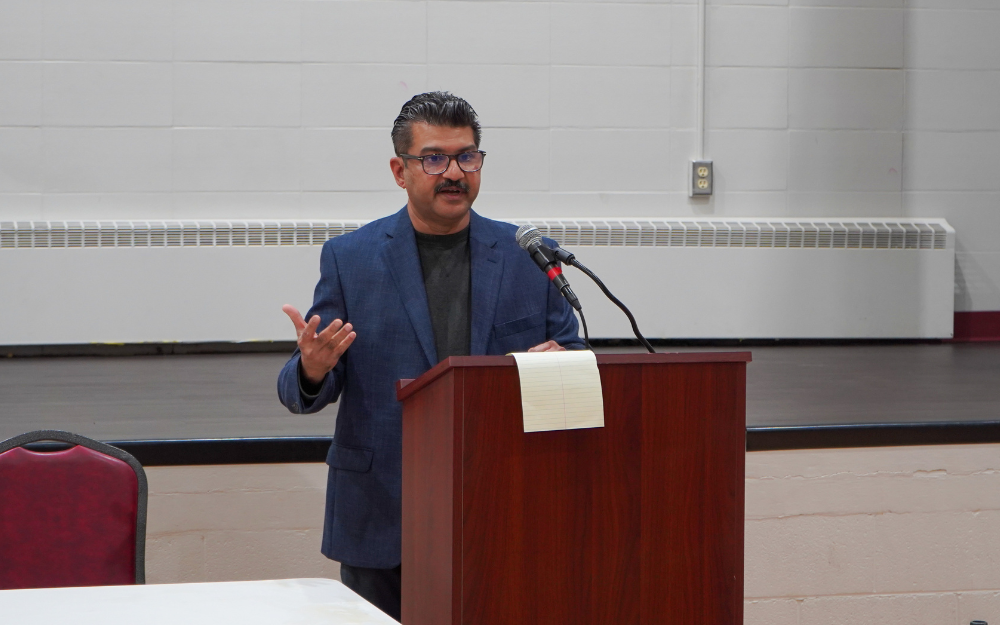
Dr. Abbas Ali asked Muslims to remember it is natural to have an emotional response when matters of faith are questioned.
“After what happened in Albuquerque, after the confusion and worry, after the facts settled, the consensus in our community was to be proactive,” said Wassim Malas, executive director of the Wisconsin Muslim Civic Alliance.
Organizers called it a “historic event.” “It’s the first time Sunni and Shiite in Wisconsin came together for the explicit purpose of listening to each other and praying together, Arshad said.
“We put it together quickly because it was needed now,” she added. “Nevertheless, it was well attended. Over 100 people came out after work on a weeknight. People wanted this. The community was definitely behind it.”
Among others, the audience included: ISM president Salah Sarsour and several shura members; State Assembly District 48 Rep. Samba Baldeh, the first Muslim in the Wisconsin legislature; Madison Alder Syed Abbas, the former Madison City Council president who recently came in second in the primaries in the State Assembly 46th District race; former ISM president Iftekhar Khan; Will Perry, executive director of the Milwaukee Islamic Dawah Center and WMCA president; ISM-West Council Member Tahseen Hussaini; Sheila Badwan, the lead of Hanan Refugee Relief’s Wisconsin chapter; members of the MMWC and the WMCA; members of the Islamic Resource Center staff; and several recent Nasef Scholarhip winners, evacuated from Afghanistan during the crisis and now starting their studies at the University of Wisconsin-Milwaukee.
Highlighting the commonalities
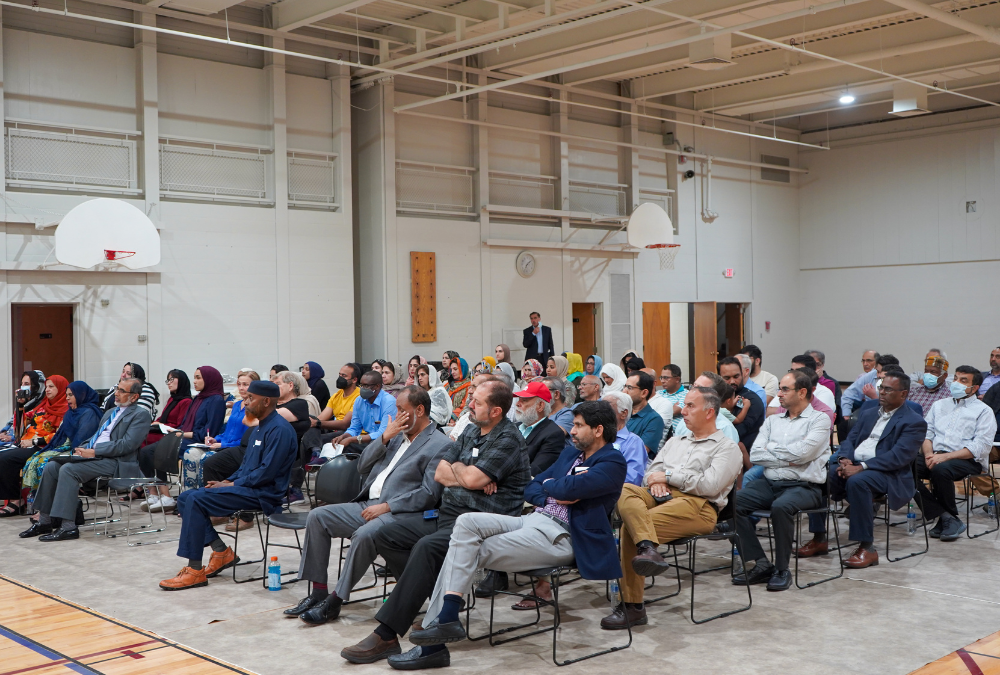
A diverse audience attended the “Sunni & Shia Prayer for Unity” Wednesday at the Insight Life Learning Institute in Brookfield.
“What we heard all evening was that sectarian hate is not in our scriptures, our scholars do not teach it and it should not be taught in our mosques,” said Arshad. “The speakers expressed that very clearly.”
Before Waleed Najeeb, M.D., of Mequon, ISM Shura member, began the Qur’an recitation to begin the service, he asked the audience, “Which Qur’an should I recite from, the Sunni one or the Shiite one?”
“It’s the same thing,” someone answered.
“Here is your first lesson in Muslim unity, coming from Allah subhanahu wa ta’ala (God, the most glorified, the most high). We both have the same Qur’an.”
Dr. Najeeb then recited Surat al Hujurat Q 49:13, which translated, includes, “O Mankind, We have created you male and female, and appointed you races and tribes, that you may know and cherish one another.”
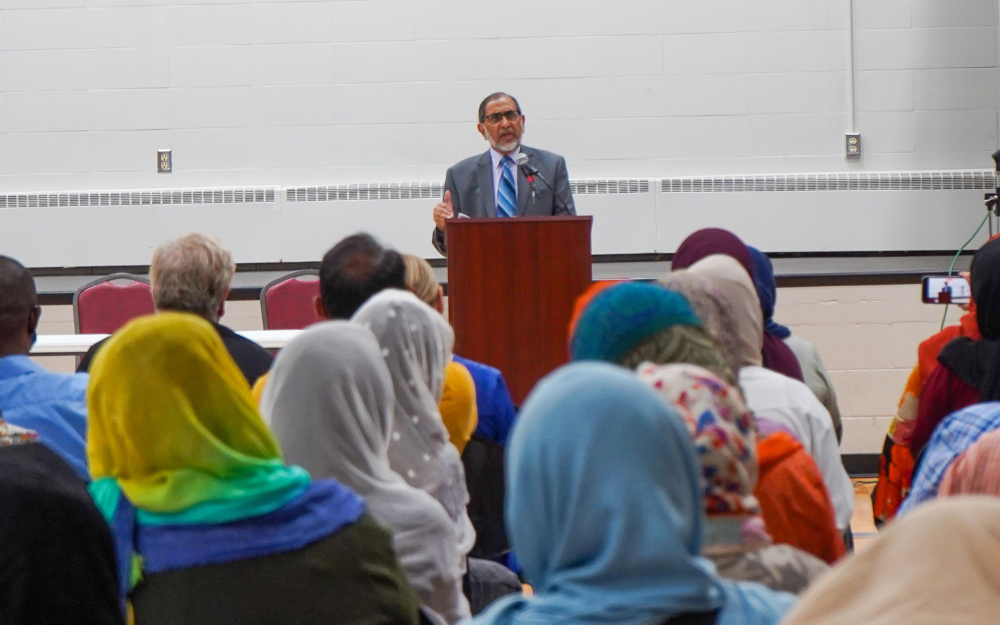
Mohammad Siddiqi, Ph.D., Western Illinois Professor Emeritus, advised Sunni and Shiite to focus on their commonalities.
Sayyid Sameer Ali, a shayak at Al Zehra Islamic Center, a Shiite mosque in Wauwatosa, Marquette University’s Muslim chaplain and a member of the Shiite-Sunni Muslim Unity Group, highlighted common articles of faith shared by Shiite and Sunni, including “the oneness of God, the final prophecy of Prophet Muhammad, the immutable and eternal message of the Qur’an and the final day of judgment. “We hold these articles to be indispensable and recognize them in each other,” he said.
“Extremism begins to make us forget the bravery that led us beyond the boundaries of our own sect or denomination when we reached out our hands to each other,” Sayyid Sameer said. “We have been together as a Muslim community for a number of years. Hold fast to Allah’s rope and do not be divided.
“We cannot change the course of history, which gave us our identities as Sunni and Shiite. We must celebrate that diversity. Any differences must be tackled in a peaceful, thoughtful and precise manner without any shadow of insult or harm or violence.
“In my experience, living in Southeast Wisconsin and this Milwaukee area for a number of years, I have encountered mutual respect, a sense of togetherness, fellowship and faith, and a genuine curiosity to understand each other. I realize there are elements in both communities who feel differently and would be happier if we stood against each other. To that group we say, ‘We reject your invitation to conflict. We do not want to emulate other parts of the Muslim world.’
“Today’s the first time we Muslims in the Milwaukee area have stood together, showing unity and inviting each other to reflect on our relationship. Going forward, let us not wait for any shadow to appear in order to prompt us to get together. Let us prevent any such events by actively removing all inaccurate stereotypes of each other, which may be circulated.
“The pulpit is a place of great importance in Islam, and it must not be used in peddling hatred of the other sect.” It is a place for sending out “messages of harmony and understanding, acknowledging that unity does not equal all of us being the same to be one.”
“It’s extremely challenging to maintain religious harmony in this age of globalization,” agreed Abbas Ali, M.D., a Milwaukee doctor specializing in lung disease and critical care. “Geopolitical forces use (differences among Muslims) as a tool and, as Muslims, we should be aware of that.”
Religious beliefs are deeply embedded, Dr. Ali explained. If we think someone is trying to change our beliefs, we perceive it as a threat and respond emotionally. This is why we sometimes feel uncomfortable discussing differences between religious sects. Awareness of this natural response will help us avoid unwanted conflicts, he said.
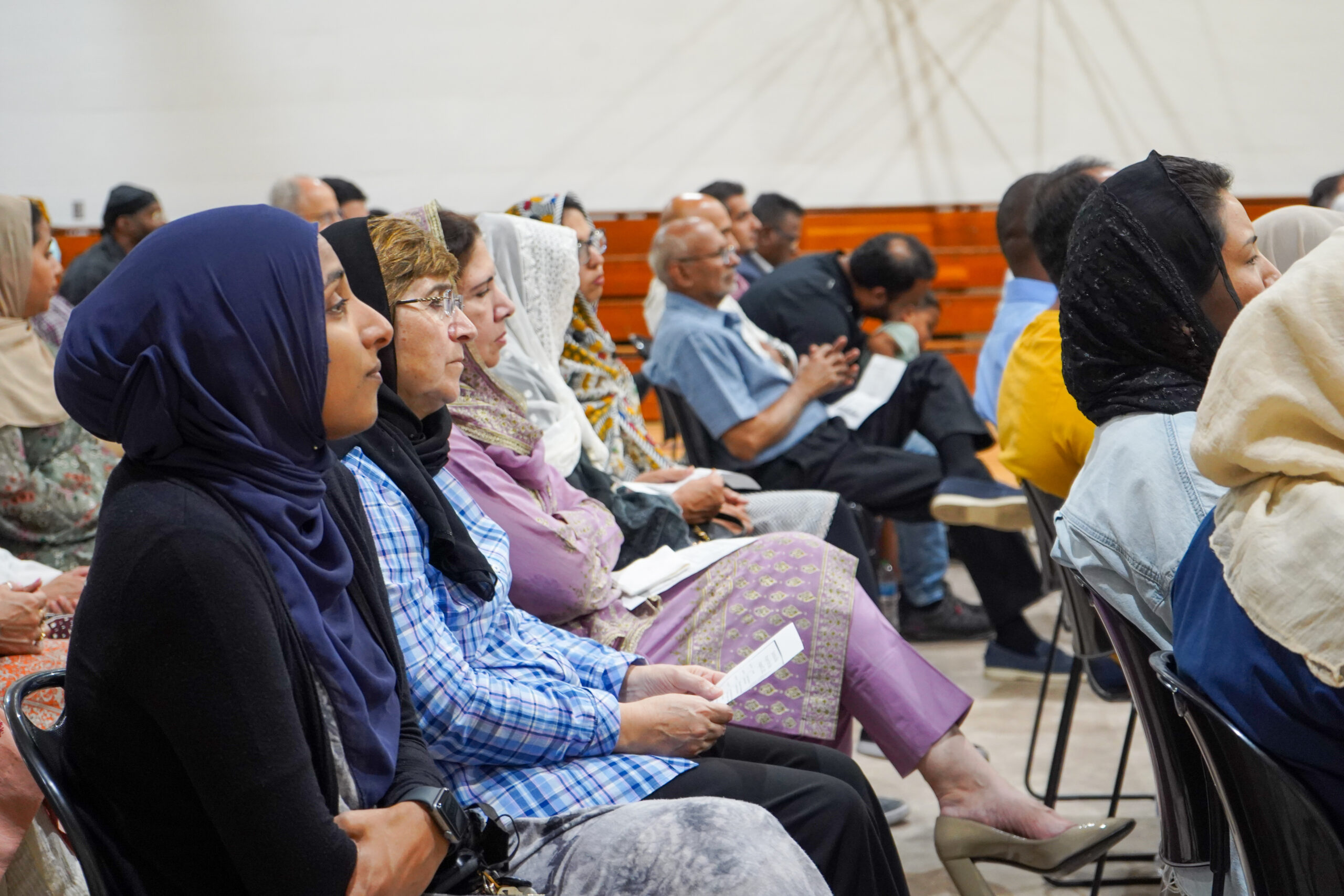
Milwaukee Muslim Women’s Coalition Board members Aishah Aslam, M.D., and Sahar Kayata Katib, M.D.
Guest speaker Mohammad Siddiqi, Ph.D., of Villa Park, Illinois, is a professor emeritus of journalism and public relations at Western Illinois University, author of multiple books and academic articles, an interfaith scholar at the Martin Luther King, Jr., Chapel at Morehouse College in Atlanta, Georgia, and a founding member of the World Council of Muslims for Interfaith Relations, among many other honors.
At the podium, Siddiqi commented, “I see a very diverse group of people in front of me and that’s a source of strength and inspiration.”
He advised the audience to “concentrate on the points of agreement. The most salient are those that deal with the fundamental issues of religion—faith in one God, in Muhammad as his prophet, the Qur’an as God’s word and the five pillars of Islam. The points of difference have to do with minor issues and must not be allowed to become an obstacle in the process of dialogue and unity.
“Having differences of opinion is something that is quite normal,” he said, explaining they are similar to the differences in opinion among the various Sunni schools.
He also advised the audience to focus on Milwaukee. “There are places in the world where the Shiite are persecuted by the Sunni and other places where the Sunni are persecuted by the Shiite. Reflecting on those will not solve the problems because we have no power to resolve those political issues. Let’s only talk about this at the level of this wonderful city where you have a very vibrant Muslim community.
“In Islam, there is no compulsion in religion. Some people think this refers only to Muslim and non-Muslim relations. In my humble understanding of this words, this instruction serves as a guidance for the Muslim community as well to not impose their interpretation of Islam on others.”
Siddiqi praised the Milwaukee community for coming together. “It will isolate the extremist fringe,” he said. “As Brother Sameer (Imam Ali) said, the doors (to mosques in Milwaukee) are open. Visit each other. The more we understand each other and the more we learn about each other, the more our respect and love toward each other will grow.
“In a city of this size (we are not in Chicago, where we have to travel one and a half hours from one mosque to another), it is important to know each other. We have to visit each other. It is everyone’s responsibility to pave the way for smooth relations.”
Zulfiqar Shah, Ph.D., Islamic Society of Milwaukee religious director, made the case for uniting with all those who believe in one God. Those who challenge our faith – agnostics, atheists and secularists—“do not differentiate between Jew, Christian or Muslim. They challenge the concept of God.” Even if all the Jews, Christians and Muslims put their efforts together, the enemies are far stronger, he said.
He reflected back on Christian history, when wars raged between Catholics and Protestants. “We don’t want this nonsense,” he said. “We agree upon the things we agree and we disagree about the things we disagree. That is not a cause for hatred.
“Many of our young people have nothing at all to do with these issues,” he added. “They could care less. We need to be very careful to become good Muslims. That is more important.”
How the Prayer for Unity event came together
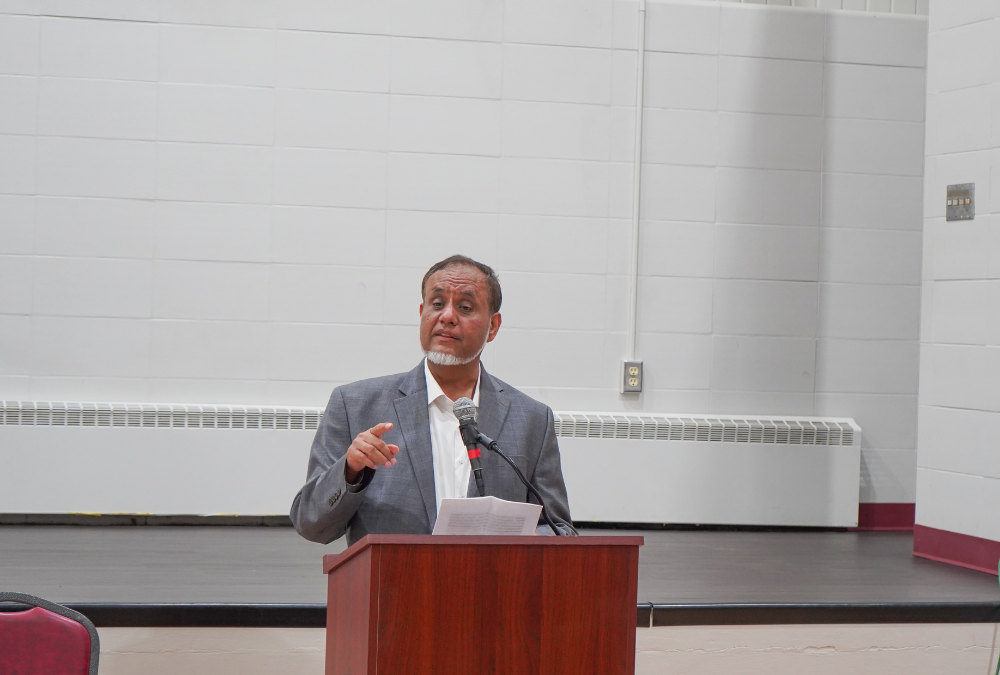
ISM Religious Director Zulfiqar Shah, Ph.D., a renowned Islamic scholar, is also an expert in comparative religions.
“A number of people in the Muslim Unity Group initiated the event and the WMCA took the lead because it saw the value and importance of a civic organization to bring Muslims together,” said Janan Najeeb, a member of the Muslim Unity Group and WMCA founder. The Milwaukee Muslim Women’s Coalition’s board also voted unanimously to participate and the Insight Life Learning Center was very eager to host it, she said. (Najeeb also founded the MMWC.) Emad Abutabanjeh, co-owner of the institute, welcomed attendees to the event.
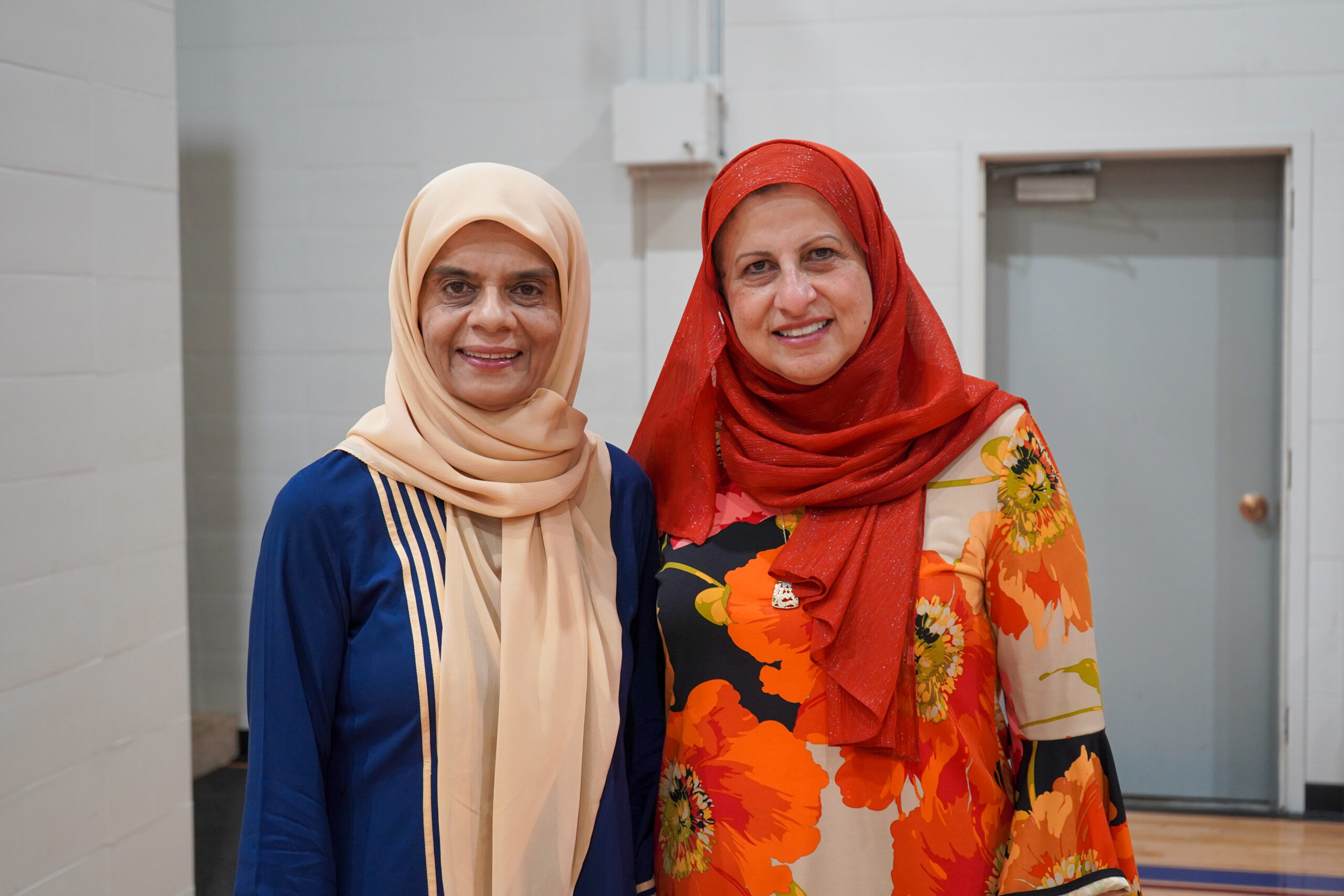
Naheed Arshad (left) and Janan Najeeb (right), members of the Shiite-Sunni Muslim Unity Group
“Participating was a no-brainer for those of us who consistently work with many groups of people and don’t carry sectarian baggage from (our) countries of origin. Much of the sectarian animosity in some of the predominantly Muslim countries has been used by non-representative governments as a way to divide and conquer.”
“The Muslim Unity Group with Shiite and Sunni members has been meeting since 2018,” Arshad explained. “We felt we need to know each other better. We could do better, know each other way better than we do.”
The group of about 25 met, shared Ramadan iftars and started a WhatsApp group to maintain an ongoing dialogue, she said. The group has grown to 35 and new members are being added at their requests, Arshad added.
The idea for Wednesday’s event was sparked by an article shared in the WhatsApp group following the Albuquerque shootings in which a Sunni chaplain urged fellow Sunnis to proactively confront anti-Shiite hate and uplift Shiite voices, she said.
“We discussed ways to build bridges among ourselves. The idea came up and we quickly discussed where, how and who should speak. It was short notice but it was the need of the hour, an event that should not be delayed.”
A call for action
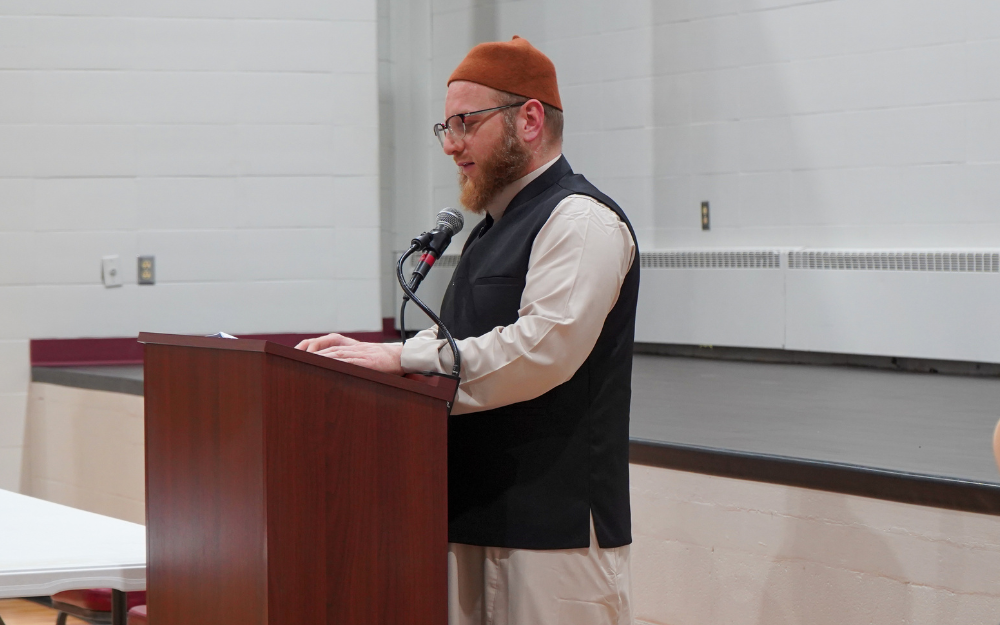
Sayyid Sameer Ali called for Shiite and Sunni to create a document together calling for mutual understanding.
In his talk, Sayyid Sameer invited those in attendance to help move forward in creating a document “we could share and subscribe to together” that advocates for understanding and unity, he said.
Arshad said the Unity Group is ready to work on a joint document, using the Intrafaith Code of Honor developed by the Muslim Public Affairs Council as a model.
Everyone is welcomed to participate in the Unity Group, and can be added by contacting her, Arshad said. “Several people have been added in the last few days.
After the event, Arshad received a text from Milwaukee internist Mohammad Fareed, M.D., that urged for continuing intrafaith dialogue. “Speeches are always good but I believe in action,” he wrote. “Let’s try to have friendships and social interactions in a way that we don’t have to gather and speak about our common beliefs. Rather it should be know and understood as a fact ,,, May Allah (swt) bless us with His guidance to be amongst the people who bring together every human being from every diverse background and keep us away from all the divisive elements. Ameen.”
“We heard the word; now we need action,” Arshad said. “It is important our children and grandchildren see us working together. We don’t want to teach them hate. It is not who we are. It is not part of our faith.”
